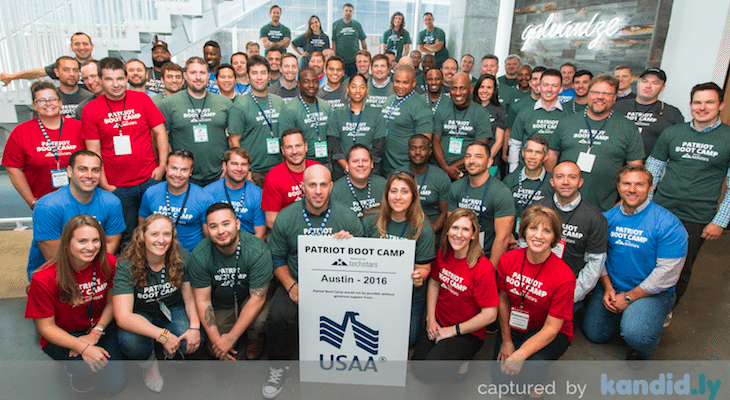After they leave the service, some military veterans choose to pursue entrepreneurship rather than taking a civilian job. But until recently, these vets often had to forge a new path and find startup resources on their own. Several organizations now aim to fill that gap.
Patriot Boot Camp offers a three-day intensive program that helps veterans and spouses build tech companies. Next year, Patriot Boot Camp is also launching its Founder Forum, a conference where alumni of the program can network and gain additional mentoring.
In honor of Veterans Day, StartupNation talked to Charlotte Creech, executive director of Patriot Boot Camp about how and why the program got started. The following excerpt has been edited for space.
StartupNation: What challenges do veterans and their families face in transitioning into entrepreneurship?

Creech: Generally speaking, the biggest gap is that they lose their network after they separate from the military. When you’re active duty, there are lots of resources that the government provides, many of which exist on the military installation. Once you separate from active duty, you lose your access to those resources.
Historically, there hasn’t been a great transition process for helping veterans consider entrepreneurial pursuits, so it really becomes a matter of you don’t know what you don’t know. There are certainly a wealth of resources available, but not having the networks to connect you with puts the veterans at a disadvantage.
You also serve military spouses. What about their transition into entrepreneurship?
Spouses face a lot of the same challenges as the service member. Typical, a military family relocates [permanent change of station or PCS for short] every two to three years. It’s really hard to have to change your job that frequently.
Entrepreneurship can be an advantage for a military spouse and give them a lot of flexibility to run their own business in a geographic location that can change over time. It can be a great advantage, but there are certainly challenges as well. Mentorship can help fill part of that gap, but there is no substitute for face-to-face contacts. If you’re in a region where there’s just not a dense population, it’s going to be challenging to build a small business.
Related: Wings for Warriors Soars with Google Products
What strengths do veterans bring to entrepreneurship?
One of the most important ones is adaptability and also the ability to navigate an environment with really scarce resources. Veterans are very accustomed to operating in an environment where there’s lots of uncertainty and risk. They’re not afraid of uncertainty, they’re not afraid of risk. They know how to mobilize people and put together strong teams.
At the end of the day, they just know how to get the job done. They know how to rally whatever resources are available to them and just do it and not waste a lot of time overanalyzing or thinking about the “what ifs.” They’re really good at scanning the landscape and seeing what’s available to them and then taking advantage of that.
Tell us more about Patriot Boot Camp.
The program was founded by Taylor McLemore. He was a tech entrepreneur and he was going through the TechStars accelerator program out of Boulder, Colorado. As he was going through TechStars, it dawned on him that there weren’t a whole lot of resources to help veterans get plugged into the tech startup community. Taylor is not a veteran himself, but he comes from a military family and so that was important to him.
He was socializing the idea with the leadership at TechStars and they said, “If you want to put something together to help create a community around this, then go with it and we’ll support you.” Taylor modeled the Camp program after the TechStars accelerator, which is known as being very mentorship-driven. He condensed the three month program into this three day crash course and ran it for the first time in 2012.
There was huge demand for the program. I actually went through that first Patriot Boot Camp cohort as an entrepreneur for my own startup and that’s how I got connected with the organization. Taylor had never thought about making this a permanent recurring program, but the entrepreneurs demanded that he continue it. In early 2015, Patriot Boot Camp officially established as a nonprofit and hired its first employees. I was one of them.
What was the biggest takeaway you got from going through the program?
The power of the network and building your own group of advisors. I have a business background, so I understand the nuts and bolts of how to write a business plan, but I had never done it before.
That gap between having the business knowledge but how do you actually do it was something I was missing. It was incredible that in such a short three day period, I came home with a hundred other entrepreneur contacts, people that were like me trying to grow their own businesses and we were all sharing resources and helping each other. I also connected with incredible subject matter experts that helped mentor me in person and were willing to continue that relationship after I left the program.
Sign Up: Receive the StartupNation newsletter!
Are there other success stories you’d like to share?
We have a bunch of exciting ones. Of course everybody’s definition of success is different, but we’ve had two of our alumni appear on ABC’s “Shark Tank” this year. One of them got a $1.5 million offer from Mark Cuban. That was Greg Coleman, one of the co-founders of Sworkit.
One of our female entrepreneurs that’s a military spouse was our first exit. Her company was acquired. That was really exciting. What was even better was then that company hired her back to continue running it.
One of our alums just got a Phase I SBIR grant. It’s for research and development and it’s government money that does not need to be repaid. It’s really competitive and difficult to get an SBIR grant. A couple other companies are growing rapidly. Netizen out of Pennsylvania just got a $9.9 million dollar contract with the U.S. Army.
Interested in participating? Patriot Boot Camp is now accepting applications for its Technology Entrepreneurship Boot Camp, which is slated for February 8 through 10, 2019 in San Antonio, Texas.






